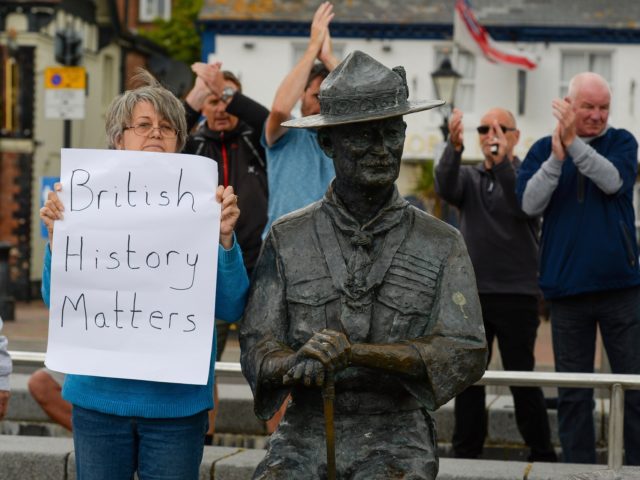Prime Minister Boris Johnson is set to empower a government minister with the ability to veto the removal of Britain’s historical statues in an effort to combat against the BLM inspired iconoclastic movement sweeping through large sections of the political left in the UK.
Under the proposed provisions, Housing Secretary Robert Jenrick would be given the final say on the removal or dismantling of statues or other monuments, instead of the current order in which local councils are allowed to make the decision.
A senior government source told The Telegraph: “The Labour Party has given the green light to cultural and historical vandalism across the country. Statues of Britain’s heroes from Sir Francis Drake to Admiral Nelson are under threat from Marxist militants, working hand in glove with Labour councillors.”
The source added that the plan would “protect Britain’s heritage, and ensure all planning decisions are made with due process and due consideration of historic heritage guidance”.
The move to remove local control over the decision-making process is reportedly being taken as government ministers believe that Labour councils will not follow due process before removing the statues.
Last week, Prime Minister Boris Johnson told Tory members: “We are proud of this country’s culture and history and traditions; they literally want to pull statues down, to rewrite the history of our country, to edit our national CV to make it look more politically correct.”
Khan’s London: Historic Statue Pulled Down to Appease Leftist Protests https://t.co/u6RdttMPQm
— Breitbart London (@BreitbartLondon) June 9, 2020
The Black Lives Matter inspired furore over British history doesn’t end with statues and monuments, however, as the National Maritime Museum was revealed on Sunday to be reviewing the “heroic status” of Vice-Admiral Horatio Nelson in order to challenge the “barbaric history of race and colonialism”.
According to internal documents seen by The Telegraph, the museum will seek to take advantage of the “momentum built up by the Black Lives Matter movement” in order to change displays, including those commemorating the British war hero’s legacy, in favour of highlighting “aspects of slavery relating to the Royal Navy”.
The museum said that Nelson displays might see “wholesale changes” in order to highlight the “more complex” vision of his heroic life, notably the support he voiced for slaveholders in the British Empire.
The collections team said: “We are in the process of rolling out our new strategy and part of this is looking specifically at the issues raised by the Black Lives Matter movement. All museum collections are partial, and history is often told from a particular perspective.”
‘England Expects’: Horatio Nelson, Naval Hero, Born This Day in 1758 https://t.co/U83JmVKFXJ
— Breitbart London (@BreitbartLondon) September 29, 2020
In June, the far-left Stop Trump Coalition activist group published a ‘hit list’ of supposedly racist British monuments that should be targeted for removal. The Labour Party quickly followed suit, announcing that all 130 local councils controlled by Labour would review statues for removal.
London Mayor Sadiq Khan also jumped into the act, announcing the creation of the Commission for Diversity in the Public Realm in order to review every monument and statue in the British capital.
“Our capital’s diversity is our greatest strength, yet our statues, road names and public spaces reflect a bygone era,” Khan said.
Khan’s Red Guard: London Mayor Vows to Replace Monuments with Statues of LGBTQ+ and Minority Figures https://t.co/XgjsXs8XG2
— Breitbart London (@BreitbartLondon) June 9, 2020
The moves came shortly after Black Lives Matter radical leftists vandalised statues and monuments across the country following the death of George Floyd in America. ‘Peaceful protesters’ tore down the statue of Sir Edward Colston in Bristol, before chucking it in the local harbour.
During June, BLM inspired activists vandalised the statues celebrating Abraham Lincoln and Sir Winston Churchill in London, and Queen Victoria in Leeds. Protesters were also witnessed attempting to burn the British flag on the Cenotaph, the nation’s war memorial.
On Sunday, the chairman of Policy Exchange’s History Matters Project, Trevor Phillips, said: “In recent months, Policy Exchange has documented more than 100 cases where aspects of our shared past – from statues to street names and what is taught in schools and universities – are being erased, without genuine debate and with very little consultation with the public who pay the bills.”
“We should recognise changes in public sentiment, but our response in a democracy must not be driven just by those who shout loudest. It is very welcome news that ministers will be able to ensure that if change takes place it will be by public consent rather than by extremist coercion,” Phillips added.
"Perhaps not since the era of Oliver Cromwell, when Puritans smashed and burned any work of art or architecture they deemed impure, has Britain engaged in such a frenzy of iconoclasm." https://t.co/PHewYcpTFK
— Breitbart London (@BreitbartLondon) June 9, 2020
Follow Kurt Zindulka on Twitter here: @KurtZindulka

COMMENTS
Please let us know if you're having issues with commenting.